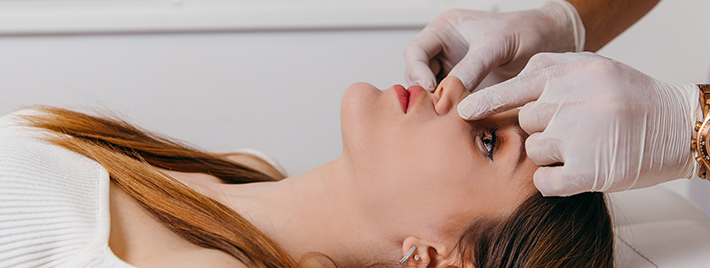Post Date: 12/16/2022

Rhinoplasty is a surgical procedure performed to change the shape of the nose or improve functional problems. The procedure is performed under general anesthesia and may involve reshaping the bones and cartilage.
Rhinoplasty can be performed for individuals of any age, but it is usually performed after the age of 18. However, there may not be an age limit of 18 for individuals who have suffered damage to their noses due to hereditary or various accidents. Before rhinoplasty, it is necessary to undergo a detailed physical examination. For rhinoplasty to be performed smoothly, the general health status of the individual who is a candidate for treatment must be suitable for treatment.
In general, swelling and bruises may occur in the nose area after the nose aesthetic operation. For this reason, you can accelerate blood circulation and reduce swelling with various measures by taking into account the recommendations given by your doctor after surgery. It is also important that you keep the nose area clean after surgery. You need to use the medicines prescribed by your doctor regularly. After rhinoplasty, it is recommended to avoid heavy exercises and physical activities. In this process, it is important that you act according to your doctor's recommendations. In this way, your healing process can progress quickly and healthily.
The most preferred types of rhinoplasty are two types: open and closed rhinoplasty. Depending on the needs and preferences of the individual, the type of rhinoplasty can be determined by a specialist ENT or rhinoplasty surgeon.
Open rhinoplasty requires making an incision in the outer part of the nose. This procedure makes it possible for the rhinoplasty surgeon to have better access to the structure of the nose and make detailed changes, creating more space for the operation. However, open rhinoplasty may leave a small scar on the outside of the nose. Closed rhinoplasty involves making a small incision inside the nostrils. In this technique, the rhinoplasty surgeon has less access to the nose structure and causes minimal changes in the nose area. Before deciding on the best type of rhinoplasty for you, it is very important to consult your doctor and learn about the advantages and disadvantages of both open and closed rhinoplasty.
Choosing the right surgeon is very important in rhinoplasty surgery. Rhinoplasty operation should be performed by a board-certified rhinoplasty surgeon or ENT specialist. You can get detailed information about the surgery by meeting with your doctor before the operation and you can evaluate your doctor's attitude by asking your questions about the treatment.
The fact that the specialist ENT has completed his / her education in an authorized health institution, that he has specialized in rhinoplasty surgery and has sufficient experience in this field, that the previous procedures related to rhinoplasty surgery have been completed successfully and gladly, that he has all the necessary licenses and authorities for rhinoplasty surgery, and that he has aimed to give the most accurate information to his patients before and after surgery are important criteria that you should pay attention to in choosing a rhinoplasty surgeon. Paying attention to these criteria can help you be confident in the expertise of the rhinoplasty surgeon or specialist ENT who will perform the procedure.
It is necessary to pay attention to some details before and after rhinoplasty surgery. First, you should undergo a detailed health check before surgery. In this check-up, your general health status and whether you are a suitable candidate for surgery are evaluated. It is also advisable to reduce smoking before surgery or, if possible, to quit altogether, since it is known that smoking reduces blood circulation in the nasal area and with it can adversely affect the postoperative recovery process.
After rhinoplasty, swelling and bruises may occur in the nose area. For this reason, you may need to follow your doctor's recommendations to accelerate blood circulation in the nose area and reduce swelling. Also, it is important that you keep the nose area clean after surgery. After the operation, you may need to use the medicines prescribed by your doctor regularly. During the recovery process after rhinoplasty, it is recommended to avoid heavy exercises and physical activities. In this process, it is extremely important that you act by your doctor's recommendations.